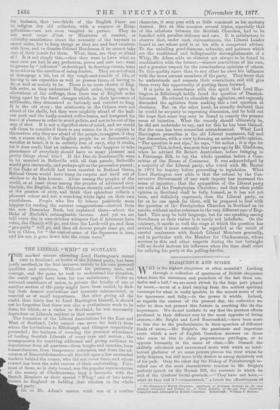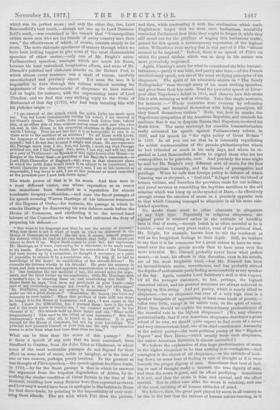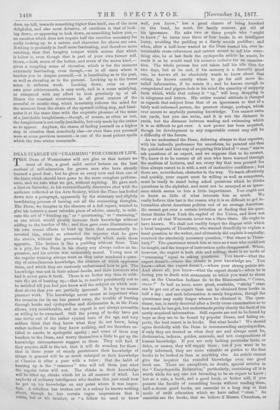ELOQUENCE AND SCORN.
WHY is the highest eloquence so often scornful? Looking through a collection of specimens of British eloquence taken from the statesmen and preachers of the last three cen- turies and a half,* we are much struck by the large part played by scorn,—scorn of a kind varying from the noblest spiritual contempt for what is really ignoble, to the merest scorn of wit for ignorance and folly,—in the power it wields. Indeed, as regards the orators of the present day, the collection we refer to does not present this feature in anything like its due importance. We do-not hesitate to say that the greatest effects produced in their different way by the most opposite of living orators,—Mr. Bright and Lord Beaconsfield,—have been more or less due to the predominance in their speeches of different kinds of scorn,—Mr. Bright's, the passionate and imperious scorn which a sort of English Gracchus showers on those who seem to him to claim preposterous privileges, or to oppress humanity in the name of class,—Mr. Disraeli the skilfully calculated and envenomed scorn with which an intel- lectual gladiator of no mean powers pierces the rival whom he truly despises, but still more truly desires to sweep decisively out of his path. Only the other day the Bishop of Peterborough re- called one of the most characteristic touches in Mr. Bright's pathetic speech on the Burials Bill, the sentence in which he said of the Quakers' burial-grounds,—" They have not been,— what do they call it ?—consecrated," a touch the effectiveness of Tits Treasury of British Eloquence. Specimens of Brilliant Orations by Ow most Eminent Statesmen and Divines, ST., of Oreat Britain, of the last Four Centuries. Complied and Arranged by Robert Ooohraue. Edinburgh William P. Malmo. which was its perfect scorn ; and only the other day, too, Lord Beaconsfield's best touch,—though not one up to Lord Beacons- field's mark,—was contained in the remark that "Cosmopolitan critics mean men who are the friends of every country save their own," the effectiveness of which, of course, consists simply in its scorn. The more elaborate specimens of oratory through which we have been looking happen to give none of the most characteristic speeches of either orator,—only one of Mr. Bright's extra- Parliamentary speeches, amongst which are much his finest, because his least restrained, imaginative efforts, and none of Mr. Disraeli's polished and elaborate attacks on Sir Robert Peel, in which almost every sentence was a skaft of venom, carefully manufactured and precisely aimed. 'Yet none the less, it is impossible to turn through this volume without noticing the importance of the characteristic of eloquence we have named. Let us begin, for instance, with the unpromising name of Lord Thurlow, and we End this very striking reply to the Duke of Richmond of that day (1779), who had been taunting him with
his plebeian origin :—
" I am amazed at the attack which the noble Duke has made upon me. Yes, my Lords (considerably raising his voice), I am amazed at his Grace's speech. The noble duke cannot look before him, behind him, or on either side of him, without seeing HOMO noble peer who owes his seat in this House to his successful exertions in the profession to which I belong. Does he net feel that it is as honourable to owe it to these as to be the accident of an accident? To all these noble Lords, the language of the noble duke is as applicable and as insulting as to myself ; but I do not fear to meet it singly and alone. No one venerates the Peerage more than I do ; but, my Lords, I must say that Peerage solicited me, not I the Peerage. Nay, more, I can say, and will say, that as a peer of Parliament—as Speaker of this right honourable House—as Keeper of the Great Seal—as guardian of his Majesty's conscience—as Lord High Chancellor of England—nay, even in that character alone in which the noble duke would think it an affront to be considered, but which character none can deny me—as a man, I tun at this moment as respectable, I bog leave to add, I am at this moment as much respected as the proudest-peer I now look down upon."
The whole power of that is in its scorn, And then turn to a most different orator, one whose reputation as an orator has sometimes been described as a reputation for almost bombastic imagery,—Sheridan,—and note the finest passages of his speech accusing Warren Hastings of his infamous treatment of the Begums of Oude,—for instance, the passage in which he attacks Hastings for disavowing his own defence made before the House of Commons, and attributing it to the second-hand labours of the Committee to whom he had entrusted the duty of preparing his defenoe :— "But what is his language now that he has the advice of counsel ? Why, that there is not a word of truth in what he delivered to the House of Commons as truth 1 He did not, it seems, himself prepare the defence which he road as his own before that body. He employed others to draw it up. Major Scott comes to your bar, and represents Mr. Hastings, as it were, contracting for a character, to be made ready to his hands. Knowing, no doubt, that the accusation of the Commons had been drawn up by a committee, he thought it necessary, as a point of punctilio, to answer it by a committee also. For him )1f, ho had no knowledge of the facts! no recollection of the eircuim tances 1 He commits his defence wholly to his friends ! He puts his memory in trust, and duly nominates and appoints commissioners to take charge of it ! Ono furnishes the raw material of fact, the second spins the argu- ment, and the third twines up the conclusion ; while Mr. Hastings, with a master's eye, is cheering them on, and overlooking the loom. To Major Scott he says, 'You have my good-faith in your hands—take care of my consistency—manage my veracity to the bast advantage 'Mr. Middleton, you have my memory in commission I' 'Mr. Shore, make me out a good financier I" Remember, Mr. Impey, you have my humanity in your hands l' When this product of their skill was done, ho brings it to the House of Commons, and says, was equal to the task. I knew the difficulties, but I scorned them : here is the truth, and if the truth tends to convict me' I am content myself to be the channel of it.' His friends hold up their heads and say, What noble magnanimity This must be the effect of real innocence l' But this journeyman's work, after all, is found to be defective. It is good enough for the House of Commons, but not for your Lordships. The prisoner now presents himself at your bars and his only apprehension seems to arise from what had been thus done for him."
What can be finer than the scorn of this passage ? N'or is there a speech of any note that we have examined, from Strafford to Grattan, from Sir John Eliot to Gladstone, in which some of the most noticeable passages do not depend for their effect on some sort of scorn, noble or haughty, or in the case of one or two orators, perhaps, purely insolent. In the greatest as was thought of Pitt's speeches,—the speech against the Slave-trade, in 1792,—by far the finest passage is that in which he answers the argument from the hopeless degradation of Africa, by de- scribing the similar condition of Great Britain in the time of the Romans, recalling how many Britons were then exported as slaves, and how easy it would have been to apologise in like fashion in Rome for that slave-trade, by pointing to the impossibility of ever civil- ising these islands. The art with which Pitt drew the picture, and then, while contrasting it with the civilisation which made Englishmen forget that we were once barbarians, scornfully reminded Parliament how little they ought to forget it, while they still stood out for the privilege of waging this barbarous traffic, gained for this speech a contemporary reputation of the highest
order, Wilberforce even saying that in this part of it Pitt "almost seemed to be inspired." Indeed, there is no speech of Pitt's on which the grand disdain which was so deep in his nature was more powerfully impressed.
Again, Canning's scorn for what he considered the false humani- tarianism,—partly it was false, and partly also true,—of the French revolutionary epoch, was one of the most vivifying principles of his eloquence. The spirit of his admirable alcaics on "The Needy Knifegrinder " runs through many of his most striking speeches, and gives them their key-note. Read the powerful speech at Liver-
pool after Napoleon's defeat in 1814, and observe how this strain fills it with meaning as well as vivacity. Take this single sentence,
for instance :—" Whole countries were overrun by reforming conquerors, and flattered themselves with being proselytes, till they found themselves victims." Note, too, how he mocks the Napoleonic sympathies of the American Republic, and reminds his audience that it was in despotic Russia that Napoleon received his death-blow. The same contempt for maudlin humanitarianism really animated his speech against Parliamentary reform in 1820, and his speech on "the right policy of Groat Britain" in 1823. In all you can see that he is internally repudiating the selfish sentimentalism of the pseudo-philanthropists whom he had ridiculed so much in his early days, and whom he re- garded as Lord Beaconsfield affects to regard those who are too cosmopolitan to be patriotic, now. And precisely the same might be said for Mr. Bright's very different sort of scorn for the foes of cosmopolitan humanity, and the friends of prerogative and privilege. When he calls that foreign poliey in defence of which Canning was so eloquent, a "foul idol," deluged with the blood of human victims, and describes the provision made for our military and naval services as resembling the Scythian sacrifices to the old scimitar which was hung up as the symbol of Mars,—he effectively enough rouses the emotion of scorn in a precisely opposite vein to that which Canning managed to stimulate in all his more cele- brated speeches.
No doubt there must be other elements in eloquence
of any high type. Especially in religious eloquence, the highest point is attained rather in the attitude of humility
than in that of scorn,—though Isaiah is as often scornful as he is humble,—and every very great orator, even of the political kind, Mr. Bright, for example, knows how to stir the tenderest as
well as the haughtiest feelings to their depth. Still, we venture to say that it is far commoner for a great orator to have no com-
mand over the more gentle moods than to have none over the more scornful. Mr. Disraeli probably never knew what pathos meant,—at least, his efforts in this direction, even in his novels, are of the most laughable kind,—but Mr. Disraeli has been no inconsiderable orator, nevertheless, and has probably stirred the depths of enthusiastic party feeling as successfully as any speaker of the day. Again, consider Lord Salisbury's skill in this respect.
Of all the younger statesmen, he has, perhaps, the highest oratorical talent, and his greatest successes are always achieved in harping on this string. And yet poetry, which is nearly allied to
eloquence,—for no eloquence was ever of a very high class in a Speaker incapable of appreciating at least some kinds of poetry,—
relies very little, except in its satiric vein, on the spirit of scorn.
How, then, should we explain the extraordinary predominance of the scornful vein in the highest eloquence? (We may observe parenthetically, that if over American eloquence developes a great school of its own, we should quite expect to find scorn of a novel and very characteristic kind, one of its chief constituents. Assuredly in the satiric poetry—the semi-political poetry of the "Bigelow Papers" and Bret Harte,—which usually feeds such eloquence, the native American literature is almost unrivalled.)
We believe the explanation of this large predominance of scorn in the higher eloquence to be that nothing is so contagious,—and contagion is the object of all eloquence,—as the attitude of look- ing down on some tone of feeling or cast of thought as if it were beneath the proper dignity of man. Sometimes that tone of feel- ing or cast of thought really is beneath the true dignity of man, and then the scorn is good, and its effect purifying. Sometimes it is not, and then the scorn is false and cynical, and the effect morbid. But in either case alike the scorn is catching, and one " of the most catching of all human attitudes of mind.
We believe, then, the great part played by scorn in all oratory to be due to the fact that the current of human nature running, as it
does, up-hill, towards something higher than itself, one of the most delightful, and also most delusive, of emotions is that of look- ing down, or appearing to look down, on something below you,— an emotion which does not require half the exertion necessary for really looking up to a nature and character far above our own. Nothing is probably in itself more fascinating, and therefore more catching, than that haughty temper which scorns that which is below it, even though that is part of your own former self. Scorn,—both scorn of the better, and scorn of the worse kind,— gives a tempting sense of elevation which is for the moment extremely fascinating, even though,—as in all cases where it teaches you to despise yourself,—it is humiliating as to the past, as well as elevating as to the present. Looking up in the truest sense is arduous work. Looking down, even on your own poor achievements, is easy work, and in a sense satisfying, as compared with any effort to look genuinely up at all. Hence the constant recurrence in all great orators of the scornful or caustic ring, which invariably relieves the mind for the moment from the strain of the upward-toiling step, and fasci- nates it at the same time with the exquisite pleasure of the sense of a justifiable haughtiness,—though, of course, as often as not, the haughtiness is not really justifiable, but only made by the orator so to appear. Anyhow, the charm of feeling yourself on a higher step in creation than somebody else—or even than you yourself were at some previous moment—is one of the most potent spells which the true orator commands.








































 Previous page
Previous page